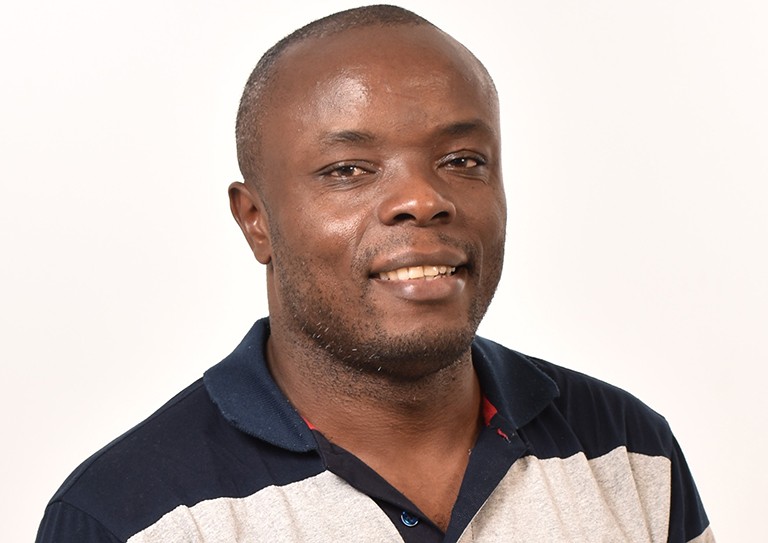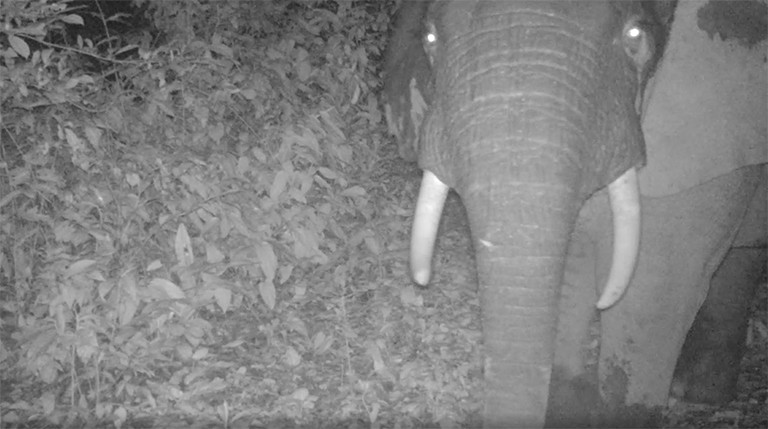‘I hope other people will be inspired to follow my path’
 Isaac Blaise Djoko: “I really valued these past five years at Concordia.”
Isaac Blaise Djoko: “I really valued these past five years at Concordia.”
Getting your PhD is no easy task under the best of circumstances. Throw in a pandemic and more than 9,000 kilometres of distance, and things get even more challenging.
Isaac Blaise Djoko arrived at Concordia from Cameroon in 2017. As a PhD student he worked under the supervision of Robert Weladji, professor of biology in the Faculty of Arts and Science.
Five years later, he is pleased to share insight into his thesis, how Concordia helped him adjust to life in Montreal and some of his future plans.
Early days
Djoko’s path to doctoral studies started in the Campo-Ma’an National Park in southern Cameroon, where he worked at the Technical Operational Unit with the Ministry of Forestry and Wildlife. He was focused on how wildlife including forest elephants interact with humans in this landscape.
“By combining social surveys and field investigations in three subdivisions, I first assessed the extent of wildlife damage to crops and identified the impact of human activities on wildlife,” Djoko explains. He used camera traps to capture the nocturnal and diurnal wanderings of the pachyderms to try to assess their pattern of habitat use, and also to identify what they frequently consume.
Djoko was already familiar with the work of Weladji and his research into elephants in partnership with the Zoo de Granby. When he learned there was an opening for a doctoral student to study under him at Concordia, Djoko says he “jumped on the opportunity immediately.”
Djoko wound up getting the position, despite healthy competition from his colleagues from other parks in Cameroon and from international applicants.
A big move
Djoko then moved to Montreal, which he says presented some challenges. “It’s a whole new cultural environment,” he explains. Since English isn’t Djoko’s first language (Cameroon is a bilingual country), he wanted to improve his skills.
“I attended meet-ups, and Concordia was also really great in helping me practice my second language.”
Djoko also learned a lot living with roommates — one Canadian and one from Morocco.
Another challenge? Winter.
“It isn’t something you experience in the tropics, obviously,” Djoko says. “For us in Cameroon, 10 degrees is cold. When you find yourself in Quebec, with these sub-zero temperatures, it’s very different.”
Djoko recalls when he was getting ready for his first Montreal winter, his Canadian roommate asked him if it had snowed overnight.
“I didn’t quite understand what he meant!” laughs Djoko. “All of this was totally new to me.”
 Still from a video taken by Blaise of an elephant roaming at night under a Sacoglottis gabonensis fruit tree.
Still from a video taken by Blaise of an elephant roaming at night under a Sacoglottis gabonensis fruit tree.
Bees and fruit trees
Djoko’s research ultimately points toward a “push-pull” method of moving elephants into safe areas and away from human farmlands.
To push the elephants off, the solution could be as simple as a honey bee. For all their massive size, elephants are scared by the tiny insect, and so establishing beehives around farmlands may help deter the elephants. This chapter of his thesis is published in Oryx – the International Journal of Conservation.
To pull the elephants to safer areas, Djoko says planting fruit trees preferred by forest elephants away from farmlands in the park and logging concessions could be the answer. As it turns out, elephants have a sweet tooth and will gravitate toward fruit-rich areas.
A fond farewell and big plans
Djoko, who is finishing up his thesis, is very grateful for all the opportunities he has experienced while in Montreal.
“I really valued these past five years at Concordia,” he says. “I learned a lot of things, because things are done differently in Canada and here at the university than they are in my native Cameroon.”
He adds that he really appreciated the collaborations with Weladji and the Zoo de Granby, especially for all the support received for his research during the COVID-19 pandemic. The MoU between Concordia University and Zoo de Granby is being renewed for another five years, meaning there will be more opportunities for tropical related research for Concordians.
“I am grateful for all their financial, material and intellectual support. My thesis grew during this time, and it’s been a wonderful journey,” Djoko shares.
After five years at Concordia, Isaac is now the prime author of five scientific articles, two published (in CatNews and Oryx), one going to press in the International Journal of Biodiversity and Conservation) and two under revision.
“I hope other people will be inspired to follow my path. I am happy and proud to be an ambassador for Concordia.”
As for what’s next, Djoko would love to help guide decisions at the Ministry of Forestry and Wildlife back home.
“I dream big — why not?” he says with a smile.
Learn more about Concordia's Department of Biology.




